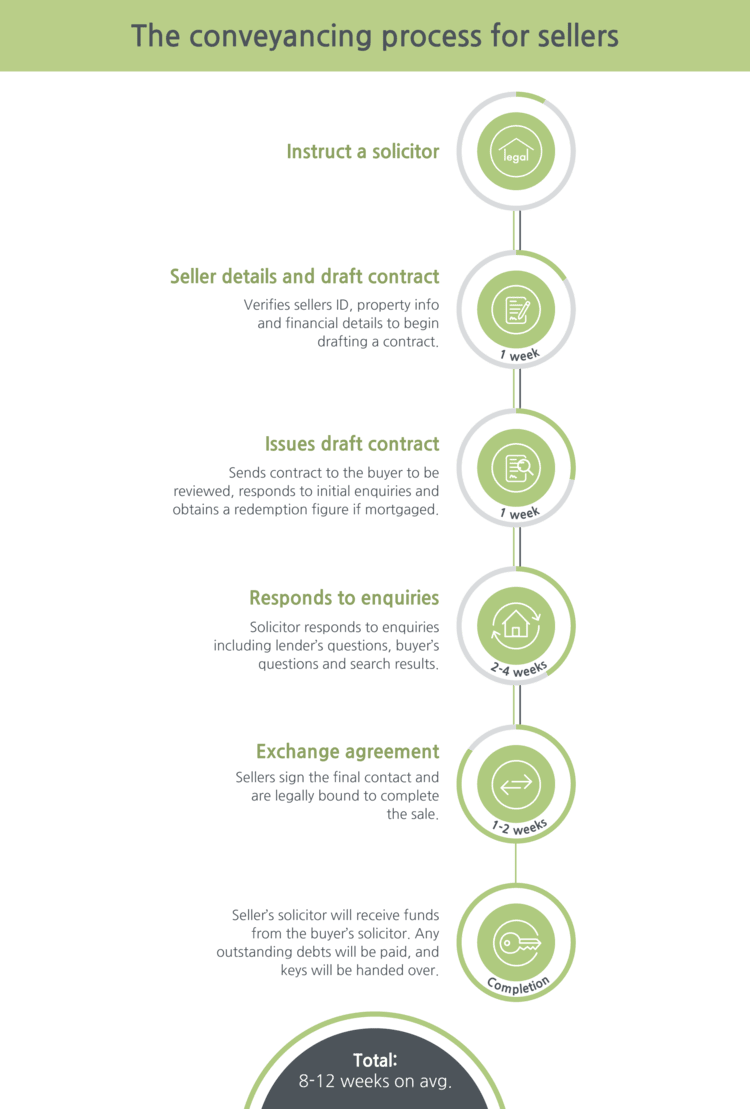Selling your home can feel overwhelming, but with the right legal support, it doesn't have to be.
Our experienced conveyancing solicitors are here to simplify the process, handling every legal detail from accepting an offer to completion.
With a proactive approach, we focus on minimizing delays and keeping you informed every step of the way. Trust us to make your property sale smooth, efficient, and stress-free.
What is the conveyancing process when selling a house?
We illustrate the conveyancing selling process on the following infographic.

Once you've accepted an offer on your house, the selling conveyancing process begins. Here are the key stages your solicitor will guide you through:
- Complete property information forms: Provide details about your property, including any included items.
- Draft initial sale contracts: Sent to the buyer's solicitor to initiate the process.
- Respond to enquiries: Answer questions raised by the buyer's solicitor.
- Agree terms and set a completion date: Finalize the sale conditions and timeline.
- Exchange contracts: Legally binding the sale.
- Completion: Transfer ownership and settle payments.
Post-completion formalities - The solicitor discharges obligations like filing paperwork with the Land Registry and confirming transactions are closed.

Why do I need a proactive solicitor for selling my house?
Why do I need a proactive solicitor for selling my house?
As conveyancing handles the legal administration of the sales process, it's important that you use a trusted and qualified property lawyer that's ready to move the sale along.
Having a proactive solicitor is especially crucial if you're in a chain. There may be a chain of buyers and sellers, where each purchase is linked to a sale. These chains may be composed of any number of buyers and sellers and having a number of people involved can often lead to delays.
At Homeward Legal, we know that when selling your house, you need a solicitor or conveyancer that will be proactive and willing to chase all the parties involved to drive the transaction forward. We know that this is the key to a fast selling process, and that's why we'll provide you with a solicitor that knows how to make the conveyancing process as smooth and stress-free for you as possible.
How much does a solicitor cost for selling a house?
The cost of conveyancing solicitors when selling a house can vary depending on factors such as property value and its legal structure (leasehold or freehold).
At Homeward Legal, the solicitor fees you are quoted for conveyancing will be exactly what you pay, with no hidden costs.
How long does conveyancing take?
The conveyancing process typically takes between 8 to 12 weeks on average, although this can vary based on individual circumstances.
Factors influencing the duration include the chain of transactions, local searches, mortgage approvals, and any legal complexities that may arise during the process. It's essential to communicate effectively with your conveyancer and other parties involved to expedite the process as much as possible.
You can also check our guide on how long the conveyancing process takes.
Do I need a conveyancer to sell a house?
Do I need a conveyancer to sell a house?
As you can see from the process laid out above, there is a lot of work that goes into the legalities of selling a house. While it's not a requirement that you use a licensed conveyancer or conveyancing solicitor for selling your house, it is advisable that you do.
A house sale can be a complex process and there are pitfalls that can occur that conveyancing experts are skilled in handling. Even if the sales process is relatively straightforward, there are forms and procedures that must be completed accurately. When selling your house, choosing a solicitor or conveyancer means that every stage of the sale takes place in the appropriate way.
Of course there are costs associated with using a specialist conveyancing solicitor when selling, but it could cost you a lot more if the conveyancing quotes and process isn't done properly - potentially leaving question marks around who the rightful owner of the property is.
So, if you're asking the question “can I do my own conveyancing when selling?” the answer is, technically, yes. But it can be a risk that's not worth taking.
When do you pay the solicitors' fees when selling a house?
When do you pay the solicitors' fees when selling a house?
When it comes to your house sale, your solicitor or conveyancer will either charge you a flat fee for their services or you'll be charged a percentage of the value of the property you're selling.
The amount you pay will depend on how detailed or complicated the process is and how many administrative fees have been added to the sale. It will also depend on the type of property you're selling. If it's a leasehold, this will come with an extra conveyancing cost.
However, the overall conveyancing fees are paid out of the proceeds of the house sale on completion day. Whether this is a flat fee or percentage of the sale price, it will have been agreed between you earlier in the selling process.
What searches do solicitors do when selling a house?
What searches do solicitors do when selling a house?
Solicitors don't carry out any searches when you're selling a property. This means that the conveyancing fees tend to be lower than when you're buying a home.
If you're buying a property at the same time as you're selling, it's worth getting conveyancing quotes from the same conveyancer and you can use them to carry out both the sale and the purchase. This could save you some money.
Why choose Homeward Legal for your house sale?
We've established an excellent reputation you can trust and helped over 30,000 customers in the past 13 years.
Editable block title (hide option available)

Fixed Legal Fee policy
No hidden costs - the legal fee you get quoted is definitive.

No-Completion, No-Fee policy
You won't pay any legal fees if your move falls through for any reason.

Search & survey protection
You won't pay for your next search and survey if your transaction falls through.

Complete support
Dedicated customer service from start to finish. We are open 6 days a week.

Local knowledge
Solicitors with offices across England and Wales.

Simple & straightforward
No confusion with legal jargon - just plain and simple English.
Our residential conveyancing solicitors are regulated under the Solicitors Regulation Authority (SRA) and Council for Licensed Conveyancers (CLC).
Get in touch for your selling conveyancing quote
If you're looking to sell your property and need a solicitor, get in touch with us today.
Call us on and our friendly team will be happy to help.
Alternatively, you can fill the form below to get an instant quote.
Frequently asked questions...
If something unexpected happens and, for whatever reason, your property transaction falls through, we know this is likely to cause you a fair amount of stress and worry.
With this in mind, Homeward Legal offers you the protection of No Completion No Fee conveyancing. This means that, if your property purchase or sale falls through at any point, you will not lose any money or the conveyancing fees you may have already paid.
When selling a property, engage a solicitor or conveyancer to manage legal aspects and ensure you have necessary documentation like title deeds, property information forms, EPC, mortgage details, and contracts for sale. These documents and professional guidance facilitate a smooth property sale. Learn more in our conveyancing process guide.
In a property chain, transactions are interconnected, meaning one sale relies on another's purchase. To ensure a smooth transaction: Maintain open communication, respond promptly, collaborate with professionals, prepare documents in advance, and have contingency plans. These actions facilitate a smoother process within the chain. Learn more about factors that can delay completion.
The best time to sell a property can often be in spring and early summer. Warmer weather and longer daylight hours typically attract more buyers, leading to increased market activity during this period. However, the ideal timing can also depend on specific market conditions and personal circumstances. Learn more in our guide on best times to sell a property.
No. With Homeward Legal's panel of conveyancing solicitors, when you get a quote for conveyancing services from us, the legal price we quote you is the price you'll pay.
You should be aware, however, that some property solicitors do not give accurate quotes, only estimates, often putting standard conveyancing fees in the small print, possibly to make the headline offer seem far more attractive. The final bill you receive may then be much more than you budgeted for as a result. With Homeward Legal, we offer Fixed Legal Fee conveyancing quote with no hidden charges and with our No-Completion No Fee.
If in the unfortunate event that your property transaction falls-through you will not be liable for any of the conveyancer's fixed legal fees for the work completed.




